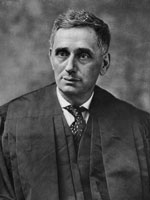Supreme Court Justice Louis Brandeis LL.B. 1877 is widely recognized as a preeminent supporter of an individual’s right to free speech, as most famously articulated in his concurring opinion in Whitney v. California (1927). Less well known, however, is the draft dissenting opinion he wrote in a companion case, Ruthenberg v. Michigan.
 In Ruthenberg, which was dismissed when the petitioner died in 1927, Brandeis first formulated the principles surrounding the exercise of free speech that would appear in Whitney. The Louis D. Brandeis Papers held by the Harvard Law School Library include seven folders of drafts written by Brandeis for Ruthenberg. The multiple drafts provide remarkable insight into the thought process and working style of the justice. They have now been digitized and are available on the law school website.
In Ruthenberg, which was dismissed when the petitioner died in 1927, Brandeis first formulated the principles surrounding the exercise of free speech that would appear in Whitney. The Louis D. Brandeis Papers held by the Harvard Law School Library include seven folders of drafts written by Brandeis for Ruthenberg. The multiple drafts provide remarkable insight into the thought process and working style of the justice. They have now been digitized and are available on the law school website.
To peruse the documents, explore the library’s Brandeis Papers finding aid or its digital collections page, which features an overview of the case by Ronald Collins of the University of Washington Law School and David Skover of the Seattle University School of Law. The authors include background on the plaintiff, Charles Emil Ruthenberg, “the political firebrand” who was to serve as the national executive secretary of the American Communist Party, and whose First Amendment rights Brandeis “went to great lengths to defend.”
